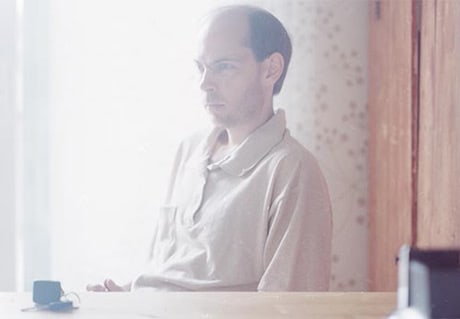Filmed almost entirely in close-up, Kazik Radwanski's feature film debut, Tower, is an exercise in stylistic experimentation, isolating us within the limited environment and scope of a socially awkward and exceedingly off-putting protagonist.
As such, its success relies on analysis and an appreciation of cinematic manipulation more so than any sort of active enjoyment or engagement, which limits, and specifies, the audience inherently.
For the duration of the runtime, 34-year-old Derek (Derek Bogart) travels between a handful of Toronto locales, occasionally drinking at various clubs while taking creepy iPhone photos of assorted patrons.
When not sitting in his parents' basement apartment working on rudimentary animation about a green monster that spends its time stacking rocks, only to have them mirror his image and take over his life, he works part-time at a construction job and starts to develop an ersatz relationship with an older woman.
In addition to deluding himself about his animation hobby, using it as a crux to avoid real-life responsibility, Derek attempts to capture a raccoon, which acts as a symbol of limited ambition gone awry, as detailed through his aforementioned animation parable about the titular "tower" of rocks.
Had this minor story of social dysfunction played out with a traditional stylistic sensibility, stepping back to provide establishing shots and an external perspective on Derek's body language in relation to his peers, it would be easier to distance and judge his character in relation to the current epoch. But Radwanski forces perspective, limiting us to close-ups of his face and the limited worldview of the things around him without allowing us the freedom or benefit of escaping his narrow lexicon.
The result is invasive and alienating, albeit intriguing through sheer consistency and refusal to give in. Just as Derek's character refuses to grow, tenuously reaching out at new things only to quickly retreat, we are forced to question our expectations of the cinematic form and narrative devices. Similarly, our desire is to retreat to the familiar and safe.
(College Street Pictures)As such, its success relies on analysis and an appreciation of cinematic manipulation more so than any sort of active enjoyment or engagement, which limits, and specifies, the audience inherently.
For the duration of the runtime, 34-year-old Derek (Derek Bogart) travels between a handful of Toronto locales, occasionally drinking at various clubs while taking creepy iPhone photos of assorted patrons.
When not sitting in his parents' basement apartment working on rudimentary animation about a green monster that spends its time stacking rocks, only to have them mirror his image and take over his life, he works part-time at a construction job and starts to develop an ersatz relationship with an older woman.
In addition to deluding himself about his animation hobby, using it as a crux to avoid real-life responsibility, Derek attempts to capture a raccoon, which acts as a symbol of limited ambition gone awry, as detailed through his aforementioned animation parable about the titular "tower" of rocks.
Had this minor story of social dysfunction played out with a traditional stylistic sensibility, stepping back to provide establishing shots and an external perspective on Derek's body language in relation to his peers, it would be easier to distance and judge his character in relation to the current epoch. But Radwanski forces perspective, limiting us to close-ups of his face and the limited worldview of the things around him without allowing us the freedom or benefit of escaping his narrow lexicon.
The result is invasive and alienating, albeit intriguing through sheer consistency and refusal to give in. Just as Derek's character refuses to grow, tenuously reaching out at new things only to quickly retreat, we are forced to question our expectations of the cinematic form and narrative devices. Similarly, our desire is to retreat to the familiar and safe.
